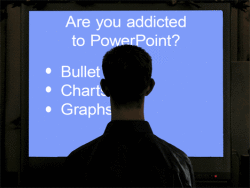My idle thoughts on tech startups
The Magical Deck – Why Investors Like Slides
 It’s no secret, we VC’s are programmed to think in Powerpoint (or Keynote if you’re an Apple person). We almost always ask entrepreneurs to show us a slide deck either before, during, or as a follow-up to a first meeting.
It’s no secret, we VC’s are programmed to think in Powerpoint (or Keynote if you’re an Apple person). We almost always ask entrepreneurs to show us a slide deck either before, during, or as a follow-up to a first meeting.
There’s lots of resources out there with suggestions on how best to construct a VC fundraising deck. VentureHacks has some good stuff on the topic and some simple searches on Google, Slideshare, or elsewhere will turn up plenty of other ideas.
But I’m not aware of many discussions of why investors usually like to see slide decks. I thought I’d try to outline some of these reasons, both good and bad:
1) Structured Conversation – I’m happy to have unstructured, informal meetings with entrepreneurs especially if they’re not in formal fundraising mode. But even if a discussion diverges away from the slides, having a deck as a guidepost for a conversation about a particular startup can be useful. It keeps both entrepreneur and investor on point and can ensure both parties cover all the areas they hope to in an initial meeting.
2) We VCs are Time Constrained / Lazy – Your average VC sees hundreds of investment opportunities each year. Unfortunately there simply isn’t enough time in the day to spend an hour or two with each and every company to hear their story. So a slide deck is often a useful tool which enables us to learn about far more companies than we otherwise would if we had to rely on meetings or phone calls alone.
Some entrepreneurs prefer to try to get a meeting rather than sharing a deck, in the belief that telling the story that way will allow more nuances to come through. I can appreciate this sentiment and given the choice between the two I think a meeting is better. But particularly for investment opportunities that don’t come thru a personal relationship with an investor or a trusted referral, the choice may be sending a deck or a potential investor never seeing the company.
3) Decks are Shareable – When I say shareable, I mean within a partnership not externally. I’ve never sent a deck outside my partnership without an entrepreneur’s explicit approval. But a slide deck is a useful, asynchronous tool for the other members of a VC partnership to get familiar with a potential investment early in the process.
4) Example of Structured Thinking – Albert Einstein famously said “If you can’t explain it simply, you don’t understand it well enough.” Yes, I know… ironic for a theoretical physicist. But having been through the process of raising money for a startup from VCs myself, I can tell you his point is absolutely true. As an investor it’s very helpful to see how entrepreneurs crystallize their product, market opportunity, and potential revenue model in a succinct presentation. If a startup concept can only be explained through a 1hr in-person meeting, for me it raises questions how clear and focused the vision is in the entrepreneurs’ own mind.
Few people (myself included) love the intellectual constraints inherent in a slide deck. And I think it’s dangerous for potential investors to become overly reliant on decks and think only in powerpoint, without digging in through personal interactions with the team, product demos, and other aspects of evaluating an early stage startup. But I think it’s useful for entrepreneurs to have some perspective on why most investors always ask for presentation decks.
